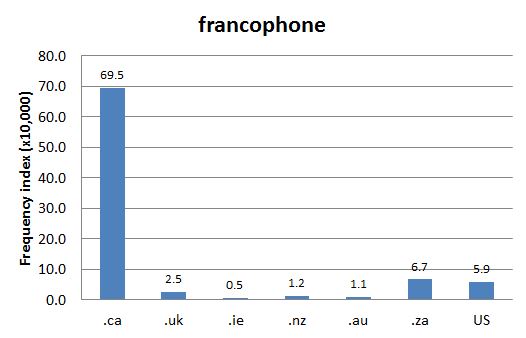DCHP-2
francophone Francophone DCHP-2 (October 2016)
1 n. — French relations
a French-speaking person.
Type: 5. Frequency — The term francophone describes a French-speaking person, or someone whose mother tongue is French (see the 1972 quotation). In Canada, the term is often used in contrast with those whose mother tongue is English (see anglophone). Thus, the word francophone is often used to describe a French Canadian (see the 1976 quotation). The term is said to derive from French, combining the terms "franco" and "phone", associated with 'French' and 'sound', respectively (see OED-3, s.v. "francophone").
The earliest Canadian attestation of the term discusses francophones in a Moroccan context, written by a reporter for a London newspaper. Moreover, OED-3's earliest attestation dates back to a 1900 source from the US (see OED-3, s.v. "francophone" (1)). This international presence highlights the term's evident semantic narrowing, from French speakers in general to French speakers in Canada. Resonance of the term in a Canadian context (see the 1968 quotation) coincides with Canada's federal movement in the mid to late 1960s towards English-French bilingualism (see Canadian Encyclopedia reference). As seen in Chart 1, the term is most frequently used in Canada. See also COD-2, s.v. "francophone" (noun), which is marked "Cdn" and Gage-3, s.v. "francophone" (1), which is marked "Cdn."See also: peasoup ((1)) (meaning 1a) allophone anglophone bilingualize Francophonie official language
2 adj. — French relations
French-speaking.
Type: 5. Frequency — See meaning 1. The same process of semantic narrowing from French-speaking to French-speaking Canada as for meaning 1 can be seen.
See also COD-2, s.v. "francophone" (adjective), which is marked "Cdn" and Gage-3, s.v. "francophone" (2), which is marked "Cdn."See also: anglophone
References:
- COD-2
- Canadian Encyclopedia s.v. "Bilingualism" Accessed 4 Apr. 2016
- Gage-3
- OED-3
Images:
Chart 1: Internet Domain Search, 22 Jul. 2014
